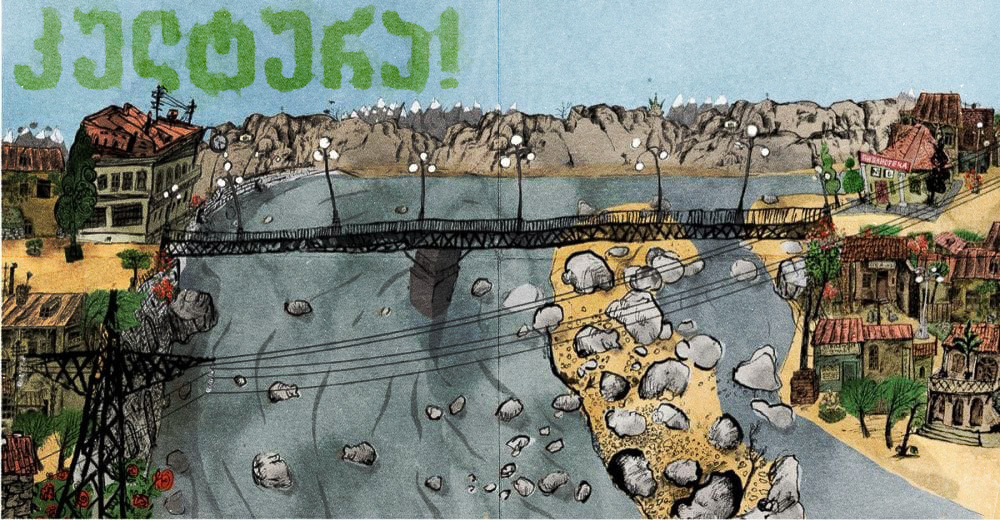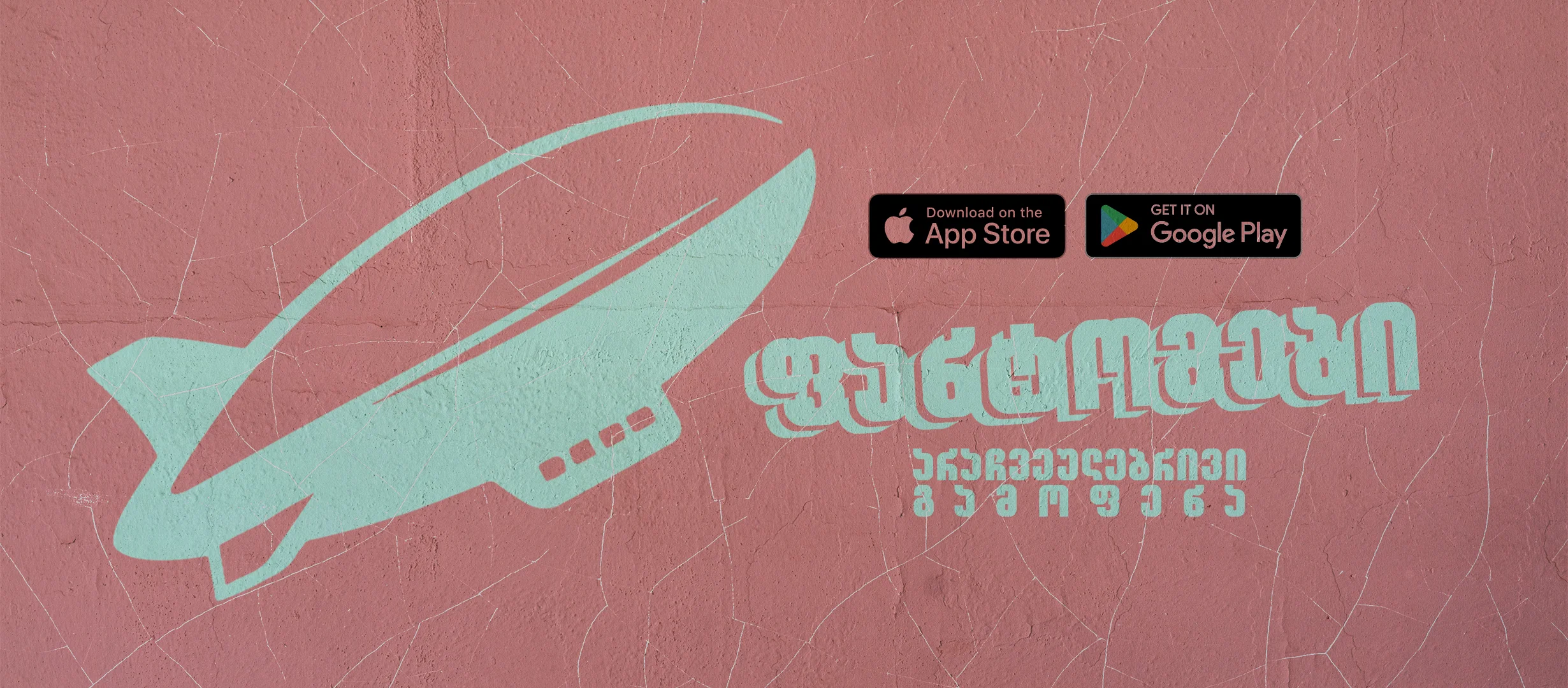Author: Tamta Turmanidze
“The city where Ertaoz set off is not marked on all maps up till now, and even today it is referred as a Various Settlement. From the houses built of thick-layered limestone or Eklar stone as they call it locally, sad guitar sound could always be heard. Half of the population in the city invaded by vineyards was drunk, and the other half was drunker, or the other way around … The renowned tragedian, fellowless Hamlet, was teased on the stage by wine bugs coming from the cellar like an open wine carboy. Horse riders were strolling on the sidewalk. They loved the words: “Geniuz” (genius), “Graduzi” (degree), “Essence”, “Balzac” – we read in “The Eccentrics” (original name “Sherekilebi”) by Rezo Gabriadze, and even though the author never once mentions the name of the city, we know for certain that this city is Kutaisi.
It’s hard to say exactly what determines the characteristics of a particular city – location, landscape, the role it has played in the country’s history or the people living there. Perhaps all these factors together, as each city has its own unique rhythm, energy, attitude towards the world and character shaped by the combination of all the circumstances.
Only a few artists could transform the city of his childhood into the geography of his own creativity and confidently mark it on the map of world literature, painting, cinema or theater.
In Rezo Gabriadze’s works, be it a screenplay, a play, narratives or paintings, exactly that Kutaisi lives on, which continues to exist only in the memories and old family photo albums of its people. In his creation Gabriadze travels through his own memories, and together with him we, his readers and spectators, immerse ourselves in his childhood memories and see everything that exists there.
Perhaps no one has ever portrayed the character of Kutaisi, the mood and the light humor hidden there like local humid air with such tender affection and love as Rezo Gabriadze did. To quote him: “Everything is shaped in childhood, and today I don’t know whether I invented this city of my childhood, or its dwellers themselves determined my own perception of its life”. It is indeed hard to find the boundary where the real city ends and the imageries and recollections of a little boy caught up in dreams and fantasies begin.
The book “Gabriadze: The Poet-Painter of Georgia” published for the Frankfurt International Book Fair in 2017 begins with the following phrase: “I was born in Kutaisi, at the extreme point of the Mediterranean, in the Christian country, on the ruins of the great Byzantium”.
Kutaisi, painted or portrayed by Rezo Gabriadze, is a small city of the Mediterranean culture, with thick-layered limestone (Eklar stone), tiled roof houses, flag-stone paved streets, the pyramidal cypress trees of the Catholic neighborhood, and yards embowered in climbing roses and wisteria. Here, at the summer movie-theater Udarnik, hellions climb trees to watch Tarzan, while the rest of the ticketless spectators watch the movie through the twinkling light reflected from the surrounding houses and memorize the stream of music coming from the screen in a way that later these melodies, “seasoned and enriched with magnolia,” can be lengthened and sung in three voices. Here in this small and serene town on Christmas Eve, the subdeacon, Assyrian Saba rings the bell in St. George’s Church of Gori and its cracked sound spreads over a drowsy Kutaisi, and here the boy on a kick scooter rushing to the library No. 6 hanging close to the White Bridge to meet the rat named Ipolite and the Musketeers of Dumas.
Kutaisi lives in all of Gabriadze’s works, it is pretty easily recognizable by its various characteristics, even if it is not named directly. In the early 80s of the last century Mikhail Tumanishvili directed a stage play “Our Little Town” based on Rezo Gabriadze’s work, and if it had not been preannounced that it was the Georgian version of American play “Our Town” by Thornton Wilder, no one would have doubted that the story of the family and relatives of the renown doctor Dimitri Alavidze could only take place in Kutaisi. The most emotional scene of the performance was played out at the Sapichkhia or Oghaskura cemetery. The beginning of the play is particularly impressive:
“Let’s explore the geography of the city until the morning star disappears so that in the future, we will know to what is located where and who is going where. Along the backstage there is the “garden’s edge,” which is the name of the sidewalk that runs along the garden, and the garden itself is called the “boulevard”; while the people on the other side of the river, ingenuous ones called it “goulevard”. Best old days of this garden are long gone.
Avenue of plane trees remembers everything including the poet, the students’ carriage drawn by the poet, the scented hand fan, the symphonic and Asian orchestras, the fundraising raffles to buy Christmas trees for poor children. Now only occasionally the sad lady Ingaroza passes by beautifully dressed in a silk-velvet dress lightly scented with “Krasnaya Moskva” (literally Red Moscow, figuratively Beautiful Moscow) – a widow of the director of the commission store, who had passed away prematurely and with ease. Peace to Raphael’s soul, – he had good greetings and fine words!”
In his world Rezo Gabriadze brought the lives to people who once lived in this city and who gained immortality by virtue of Gabriadze: Doctor Isaac Minovich, who regularly assures Rezo’s mother Sonichka that her boy is just a highly sensitive kid and his fantasies are not harmful to his health; Chito, a man who believes he’s a car with the lucky number plate ГК-45-54, who was esteemed by drivers, yielded way to and even allowed to overtake on the 1st of May; the Chief of Militia (police), the grim Valter Kakauridze, and a Tikaradze, who figures in almost all his works in a not so pleasant context: “There is a hill on the other side of the river, and Tikaradze lives over that hill, the phenomenal goofy. Thank goodness, it has nothing to do with us, and I promise you that I will not mention his name here tonight”. (“Our Little Town”)
Rezo Gabriadze’s work is characterized by one feature – just read the first two sentences and you will end up in the city of his childhood:
“The street was already white. Snowflakes were falling more and more often under the lamp, gently setting apart from each other and scattering into the darkness. – You read these stanzas and instantly finish yourself in snowy Kutaisi in 1949, where all the windows are gloomy because, regardless of the government’s ban, “everyone closes shutters and hangs their blankets and everything whatever they have over windows so that the light does not pass through them”, and prepares to celebrate good old Christmas. You get to this snow-laden town and along with the doctor and Chito take the long way through the snowstorm to eventually find yourself in a room colored by the light of a beeswax candle, at a table covered with the newspaper “Industrial Kutaisi”, accessorized with scissors, where Kutaisi’s secret guardian angel Ermonia is awaiting for you to forgive everyone everything, including yourself.
Another charmful fragment of Rezo Gabriadze’s work is the geography of the city, which seems to be particularly sensitive if you originate from Kutaisi. You read and inly follow his characters, make a guess at the paths and routes the personages will take – the doctor coming out of Grocery No. 4 with steamed up windows, having bought there 200 gr fruit drop and Padushka candies ; Opel-captain of Ermonia drives to the White Bridge; line of people standing in kerosene queue at the place where the hump of Sapichkhia ascent gets even; Little Rezo, who was going to see his teachers, unmarried sisters Agnesa and Marry, at the Tumanishvili family home in the Catholic neighborhood, was previously in Library No. 6, the entrance to which required him to be especially careful, because if anyone saw him, they would beat him like a wimp.
That is Gabriadze’s quiet Kutaisi, sometimes amusingly odd, but has always been populated by people full of the joy of life, warmed by the May sun and scent of the roses, which has long since substituted the real city to people’s imagination. This is Gabriadze’s space you immediately become a part of which once you interact with it, particularly if you are lucky enough to live at the extreme point of the Mediterranean.


